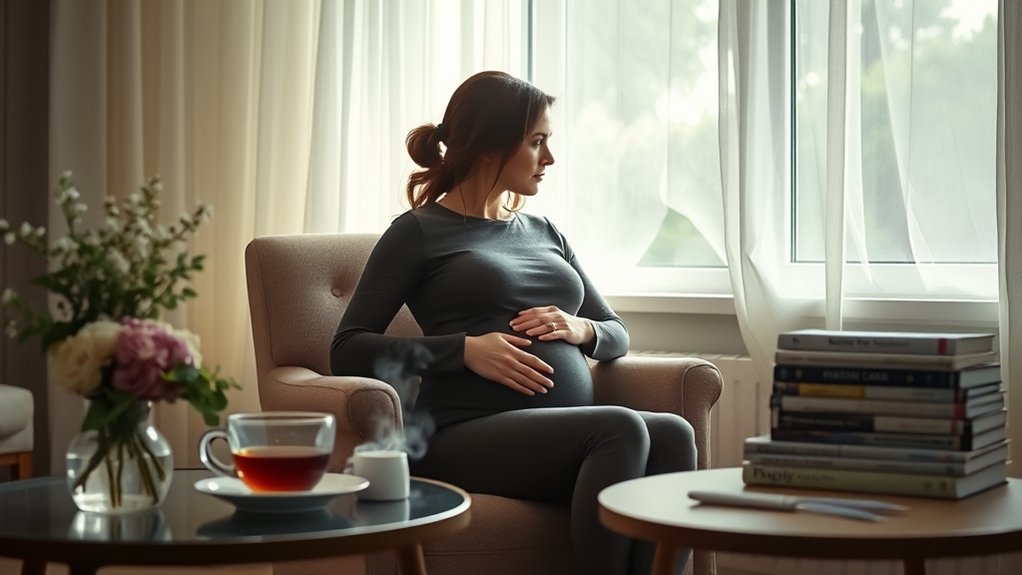Spotting in the first trimester can feel like a sudden storm cloud overshadowing what should be a joyful time. Many expectant mothers experience this, and while it can be alarming, understanding the causes and treatment options is essential. You might wonder if your symptoms are normal or if you should seek help. It’s important to navigate this journey with informed choices and support, as the right steps can make a significant difference in your peace of mind.
Common Causes of Spotting in the First Trimester

Spotting in the first trimester can often cause concern, but it’s important to understand that it can have several common causes.
One frequent reason is implantation bleeding, which occurs when the fertilized egg attaches to the uterine lining. This typically happens around the time your period would be due.
Hormonal changes can also lead to light spotting, especially in early pregnancy. Additionally, cervical sensitivity due to increased blood flow may result in light bleeding after intercourse or a pelvic exam.
In some cases, a subchorionic hemorrhage, where blood collects between the uterine wall and the placenta, can cause spotting.
While these causes are often benign, monitoring your symptoms closely is essential for peace of mind during this critical period.
When to Seek Medical Advice

While light spotting is often harmless, you should seek medical advice if you experience any concerning symptoms. It’s essential to monitor your body’s signals closely. If you notice heavy bleeding, severe abdominal pain, or passing tissue, don’t hesitate to contact your healthcare provider. Other warning signs include fainting, dizziness, or persistent pain that doesn’t subside.
Here’s a quick reference table to help you identify when to seek help:
| Symptom | Action |
|---|---|
| Heavy bleeding | Contact your doctor immediately |
| Severe abdominal pain | Seek medical attention |
| Passing tissue | Consult a healthcare provider |
| Fainting or dizziness | Go to the emergency room |
Addressing these symptoms promptly can make a significant difference in your care.
Treatment Options for Spotting

If you’re experiencing spotting during your first trimester, understanding your treatment options can help alleviate concerns.
First, it’s essential to consult your healthcare provider for an accurate diagnosis. Depending on the cause, your doctor may recommend monitoring your symptoms closely or conducting ultrasounds to guarantee fetal health.
If an infection is present, antibiotics may be prescribed. In some cases, progesterone supplements could be offered to support pregnancy.
Resting and avoiding strenuous activities can also be beneficial. Always keep your healthcare provider informed of any changes in your symptoms.
Home Remedies and Relief Techniques
In addition to medical treatments, several home remedies and relief techniques can help manage spotting during the first trimester. You might find comfort in these gentle methods:
| Remedy | Description |
|---|---|
| Hydration | Drink plenty of water to stay hydrated and reduce cramping. |
| Rest | Guarantee you’re getting adequate rest and avoiding stress. |
| Warm Compress | Apply a warm compress to your lower abdomen for soothing relief. |
| Herbal Teas | Sip on ginger or chamomile tea to ease discomfort. |
| Nutrient-Rich Foods | Incorporate foods rich in folic acid and iron, like leafy greens. |
These remedies can offer you comfort, but always consult your healthcare provider for personalized advice. Your well-being is important during this delicate time.
Understanding What’s Normal During Early Pregnancy
Understanding what’s normal during early pregnancy can ease your worries as you navigate this transformative time. Many women experience symptoms like mild cramping, fatigue, and breast tenderness.
Spotting, often light pink or brown, can also occur due to hormonal changes or implantation. While these symptoms are typically harmless, it’s important to monitor their intensity and duration. You should reach out to your healthcare provider if you notice heavy bleeding, severe pain, or any unusual changes.
Frequently Asked Questions
Can Spotting Indicate a Miscarriage in All Cases?
Spotting doesn’t always indicate a miscarriage. While it can be a sign, many women experience spotting without complications. It’s important to consult your healthcare provider to assess your specific situation and receive appropriate guidance.
Are There Any Long-Term Effects of First Trimester Spotting?
Most women experience no long-term effects from first trimester spotting. However, it’s crucial to monitor your health and discuss any concerns with your healthcare provider to guarantee both you and your baby remain well.
Does Stress Contribute to Spotting During Early Pregnancy?
Yes, stress can contribute to spotting during early pregnancy. It may lead to hormonal changes that impact your body. Managing stress through relaxation techniques could help promote a healthier pregnancy and potentially reduce spotting occurrences.
Can Diet Changes Affect Spotting in the First Trimester?
Diet changes can affect spotting in the first trimester, as your body reacts to different nutrients. A balanced diet may support overall health, potentially reducing incidents of spotting, but always consult your healthcare provider for personalized advice.
Is Spotting Different for Subsequent Pregnancies?
Yes, spotting can differ in subsequent pregnancies. Each pregnancy is unique, influenced by hormonal changes and individual health factors. It’s essential to monitor any spotting closely and consult your healthcare provider for guidance.
Conclusion
In summary, while spotting in the first trimester can be alarming, it often coincides with normal bodily changes or minor issues. By consulting your healthcare provider, you can guarantee appropriate monitoring and care. Combining medical advice with simple home remedies and a focus on nutrition can help ease your discomfort. Remember, every pregnancy is unique, and staying informed and proactive allows you to navigate this journey with confidence and peace of mind.
